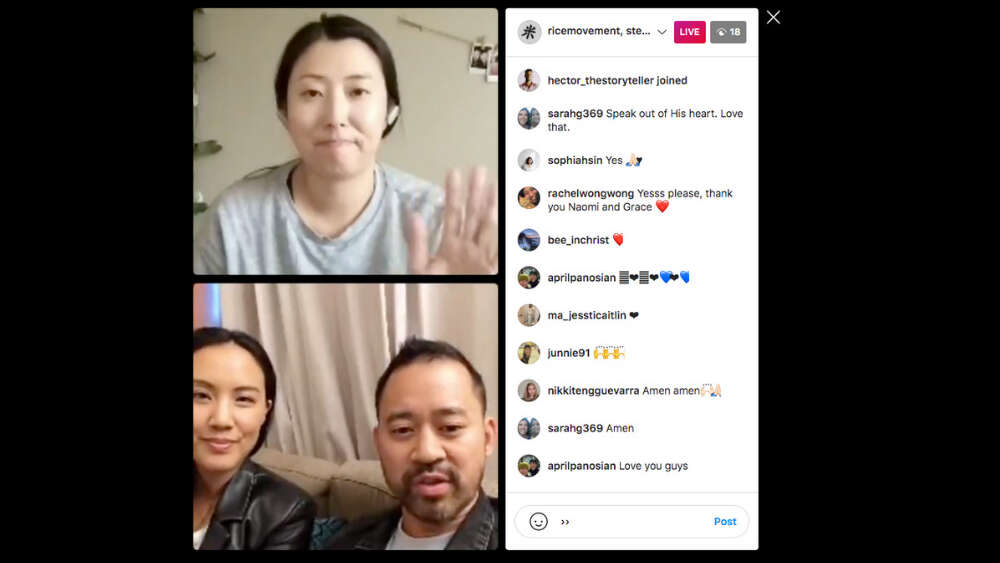What we must learn from American racism: Asian-Australian leaders
The “little acts of micro-aggression” towards Asian people in Australia show we may not be as far removed from last week’s Atlanta shootings as we think, say founders of RICE Movement, Steve and Naomi Chong.
The Chongs, along with RICE’s head of Asian Contextual Engagement Grace Lung, hosted an Instagram Live discussion today in response to the shooting of eight women – six of whom were Asian – at a massage businesses in Atlanta on March 16.
The killings could well be “racially motivated”, according to US Democratic senator Tammy Duckworth.
“I’ve been wrestling with – as [leader of] one of the largest Asian youth movements in the Southern hemisphere – are we removed from this or is this our story too? And do we need to say anything?” Steve Chong asked at the beginning of the 30-minute live video discussion, which he advertised on his Facebook page yesterday.
We have been watching with increasing horror at the events unfolding amongst the Asian American community. Asians…
Posted by Steve Chong on Sunday, March 21, 2021
While the Chongs and Lung admitted they are “still processing” the implications of the US shootings, they felt the need to discuss racism towards Asians in Australia.
“I’m starting to see this line, this pattern, this thread coming together. That’s the concerning thing for me,” said Steve Chong.
“How much as an Asian-Australian are we starting to see little acts of micro-aggression or little things that need to be called out? I’ve been recalling small moments that I’ve suppressed where Asian people have been boxed in and spoken about in ways that are negative, unfair and downright racist.”
Chong shared several of his own experiences of racism – the little “things that I’ve never even bothered voicing”, things that he usually “sweeps under the carpet”.
“I was standing is this long line at Maccas once … and this Australian male in front of me says really loudly, so that the other people who he thought were white around him [could hear], a comment about why everything’s slow – because everyone who was serving happened to be Asian.
“And he said, ‘You know why this is slow? Have a look around you.’ Then he said some offensive word [about Asians]. ‘That’s the reason.’ He got a couple of snickers from people on the left and then turned around, expecting that he would get a laugh, and then saw me standing behind me as an Asian and quickly turned away.
“I just walked away, thinking what an idiot. But actually, no, that’s significant. There’s a problem there that needs to be spoken about.”
He added, “I’m not particularly interested in making a massive political movement or that kind of thing. But I am interested in Asians being able to speak about how they feel. I think that’s very important.”
One in five Chinese Australians said they were physically threatened or attacked because of their Chinese heritage in the last year.
Grace Lung was equally passionate in encouraging Asian-Australians “to speak up about the pain and not try to suppress it, or to speak up on behalf of others who find it hard to express”.
She noted that one in five Chinese Australians said they were physically threatened or attacked because of their Chinese heritage in the last year, according to new research by the Lowy Institute.
“So [racism] may not not be the same here, but I think we see things rhyming in America and Australia,” said Lung.
She added: “Here in Australia at least, because we’re not very good at talking about race, I think we have a lot to learn from our Asian-American brothers and sisters who have been in this for a long time, especially black African-American brothers and sisters over there and Christians.
“They’ve given us a vocabulary and they’ve given us ways to reflect and respond.”
Apart from “listening and learning” from the experiences of those in the US, Lung urged Australians to examine the “different ingredients that give rise to this kind of event”.
“So there are a lot of similarities between us and America, but also a lot of differences. Some of the similarities are that both nations have had exclusion acts, pushing out Chinese as a basis of their nations [such as the White Australia policy]. Even though that was a while ago, there is a legacy and there are people who still harp back to those ‘good old days’ …
“Then there’s also a relationship with women and war, particularly Asian women. For us, it’s probably the Vietnam War. And so there’s that in the mix. There’s also a similar migration history for Asians. And so we both have very similar histories and stories.
“And yet I think in America there’s been a fire under all these ingredients and it’s kind of boiling there.
“It’s not like that here, but we do have the same ingredients, so I think it’s timely for us to be aware.”
In addition to listening and learning from those in the US, Lung encouraged Asian-Australians to “express and process some of the things that might have been suppressed”.
“Yes, we might feel angry. But I think it’s a righteous anger for injustice, right? For the injustice being done to us or others. [We need to] lament and grieve for the things that have been done to us and our communities here, which are not as intense but we’ve still been treated less than those made in the image of God.”
In doing so, Lung added that it will connect Australians “with our Asian-American uncles, aunties, elders, brothers, and sisters” and the injustices that they have also suffered “just for the way that we look, for being Asian”.
Email This Story
Why not send this to a friend?



